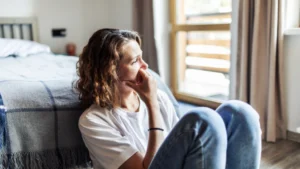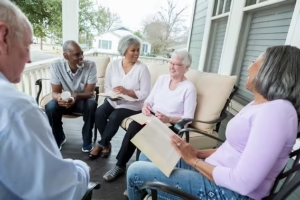Everyone naturally ages, but how we age can be very different based on the choices we make about our daily lives. We don’t have to see getting older as a loss; we can see it as a chance to live more carefully, take better care of our bodies, and find joy in every stage of life. Getting older in a healthy way isn’t about turning back time; it’s about making daily habits that help our bodies, minds, and emotions stay healthy, no matter what age we are.
Nutrition is the basis of health and vitality
Eating right is one of the best things you can do to stay healthy as you age. A healthy, well-balanced diet full of whole foods like fresh fruits and veggies, whole grains, lean meats, and healthy fats keeps the body going and helps keep age-related diseases at bay. For healthy bones, nutrients like calcium and vitamin D are important. Omega-3 fatty acids, which can be found in fish or flaxseeds, can help the brain work better.
Our bodies may not absorb nutrients as well as they used to as we get older. It’s more important than ever to watch your portions, cut down on processed sugar, and drink plenty of water. Adding foods that are high in fiber also helps your heart and stomach. Eating healthy every day has long-term benefits that help us keep our energy up, our minds clear, and our immune systems strong.
Keeping busy to keep moving forward
Regular exercise is another important thing that can help us do well as we age. The body stays strong, flexible, and adaptable by moving around. Walking, swimming, yoga, tai chi, and strength training are all good for your heart. They also help you keep your muscle mass, ease joint pain, and improve your balance, which makes you less likely to fall.
Running is also great for your mental health. It lowers worry, boosts happiness, and makes sleep better. It’s not important to train like an athlete; the point is to keep the body active. Even small amounts of movement every day, like gardening, stretching, or dancing in the living room, are very good for your health. Being active can make daily jobs easier, help you keep your freedom, and make you happier in general.
Putting mental and emotional health first
Taking care of your mental health is just as important as taking care of your physical health as you get older. Keeping up strong social ties and having purpose in life can help keep you from becoming lonely, depressed, and losing your mind. Staying socially active can make your life better and more rewarding. You can do this by helping, joining a book club, taking a class, or just talking to friends and family.
Meditation, writing in a journal, or breathing exercises are all examples of mindfulness techniques that can help you feel less anxious and more calm. Keeping a good attitude doesn’t mean ignoring the problems that come up in life; it means choosing to think about things like thanks, strength, and possibilities. To be mentally healthy, you should also get help when you need it, whether that’s through therapy, counseling, or trusted support networks.
Getting Good Night’s Sleep Every Night
Often overlooked when discussing healthy aging, sleep plays a crucial role in overall health. We may change the way we sleep as we get older, but the need for restful sleep stays the same. Not getting enough sleep can make your immune system weaker, cause memory loss, make you gain weight, and cause mood swings.
Making the bedroom more sleep-friendly and consistent, limiting screen time before bed, and setting up a regular bedtime routine can all help you get a better night’s sleep. It also helps to stay away from big foods, booze, and coffee in the evening. If you keep having trouble sleeping, seeing a doctor can help you figure out what’s causing it. This can help you get better rest and have more energy during the day.
How to Keep Your Brain Active and Sharp
Taking care of your brain health is part of aging well. The brain can benefit from daily training in the same way that muscles can. Mind-boggling activities like puzzles, reading, learning a new language or skill, or playing an instrument keep neurons firing and can delay the start of memory loss or cognitive decline that comes with getting older.
People thought that as you age, you can’t make new brain links, but staying open and mentally active can help. Mental stimulation, along with social contact and physical exercise, makes for a strong trio that protects brain health over time.
Taking Charge of Your Stress
Stress that lasts for a long time speeds up the aging process and makes inflammation, heart problems, and mental tiredness more likely. One of the most important daily habits for good age is learning how to deal with worry well. Mindful breathing, walks in nature, spending time with pets, or just being still for a few minutes a day can all help lower cortisol levels and improve inner balance.
It’s important to figure out what stresses you out and come up with ways to deal with them that work for you. Managing your stress every day, whether it’s through a creative hobby, limiting your media use, or setting healthy limits, is good for your health in the long and short term.
Regular health checks and preventative care
Preventive care is the most important thing you can do to age with grace and confidence. Checkups with your doctor help find problems early, keep an eye on long-term conditions, and make sure you have all of your shots. Checking for diabetes, high blood pressure, high cholesterol, eye, and hearing problems can help catch problems early and stop them from getting worse.
When you trust your healthcare provider, it’s easier to talk about your worries, go over your medicines, and make decisions about your own health. In addition to receiving professional care, monitoring habits such as smoking, drinking, and sun exposure can significantly influence the aging process of the body.
Putting gratitude and joy into action
Being grateful is one of the most energizing things you can do to stay healthy as you age. Appreciating the good times every day, even if they are small, can change your attitude and make you stronger emotionally. Studies have shown that people who regularly show thanks have better relationships, less worry, and better sleep.
Choosing joy every day, whether it’s through laughs, art, nature, or company, makes life more emotionally rich in a way that drugs can’t. It transforms the fear of aging into an enjoyable journey.
To sum up, aging well means living well.
You don’t have to stay young to age well. Instead, you should make changes to your lifestyle that support your body, mind, and spirit as they change. No matter what age, anyone can succeed by making small, regular changes to their eating, exercise, sleep, mental health, and self-care. You can start at any time.
Choosing to age well every day is based not on perfection but on growth. If you have the right mindset and habits, your later years can be the most exciting and important.




